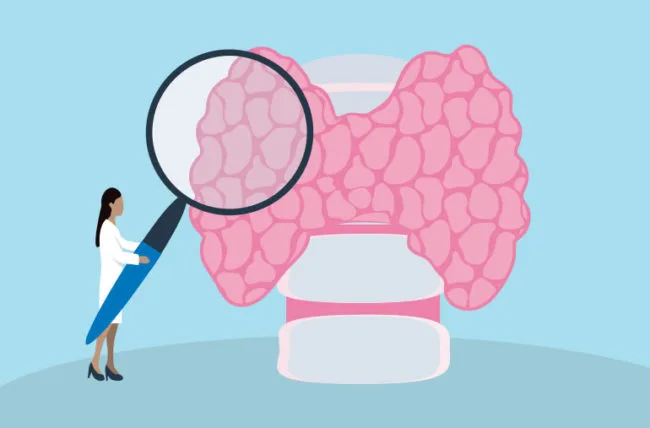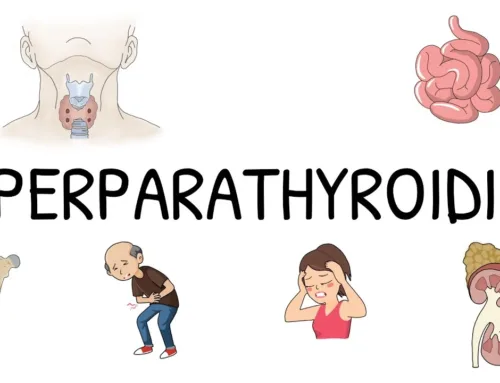If you’ve been diagnosed with autoimmune thyroid disease, you may be wondering if the disease is hereditary. After all, your siblings and parents were exposed to the same environmental factors as you—so why do they seem to be fine? There can be several reasons for this discrepancy between family members with autoimmune diseases and those without. The first step in getting answers about whether or not a certain condition runs in your family is knowing what that condition is:
Thyroid disease can fall into one of two categories:
- Hypothyroidism
- Hyperthyroidism

The genetics of thyroid diseases
Recent scientific research has shown that genes can significantly impact thyroid disorders. Genetic factors highly influence two crucial hormones, thyroxine and TSH, responsible for regulating metabolism and other bodily processes. As much as 67% of thyroxine and TSH concentrations may be determined by genes, indicating that many thyroid risk factors can be predetermined genetically.
Several genes may be responsible for mutations that can lead to thyroid diseases. Studies have identified a few genes, such as Phosphodiesterase 8B, Iodothyronine deiodinase, and Iodothyronine deiodinase two, that may contribute to thyroid problems. However, no single gene has been identified as the primary cause of any thyroid disorder.
Besides hyperthyroidism and hypothyroidism, genetics may also play a role in other thyroid conditions, such as Hashimoto’s disease, Graves’ disease, and some thyroid cancers. Hashimoto’s disease and Graves’ disease are autoimmune disorders that can result in the under or overproduction of thyroxine by the thyroid gland. Thyroid cancer can also be linked to genetics.
If you suspect your genes are responsible for your thyroid disorder, specialized gene tests can help diagnose the condition. However, if you want to monitor your thyroid hormone levels at home, you can opt for an at-home lab test to get started.
How to test for genetic thyroid disorders?
Genetic testing is available for those who want to know if their thyroid problems are genetic. Healthcare providers can use thyroid fine needle aspiration biopsy (FNAB) tests to analyze gene sequences and molecules associated with thyroid diseases. In FNAB, healthcare providers insert a fine needle into a thyroid nodule to extract a sample. They then analyze the thyroid cells in the sample for genes linked to thyroid dysfunction. They use gene sequencing techniques like the Afirma gene expression classifier, fluorescence in situ hybridization, and Sanger dideoxy sequencing.
While professionals must perform these tests, you can monitor your thyroid function at home through hormone tests.
A few other options include:
- Thyroid ultrasound:
An ultrasound uses sound waves to create images of structures inside the body and helps doctors evaluate the thyroid gland and surrounding tissues; it’s often used as a first step in diagnosing thyroid problems because it doesn’t require radiation exposure like CT scans do. Ultrasounds are also used when people want more information about their health status before deciding on treatment options or surgery (for example, women think about having children).
- Thyroid biopsy:
In this procedure, doctors remove samples from different parts of your thyroid gland using needles inserted through small incisions on either side under local anesthesia so that no cutting is required during surgery (you’ll feel only mild pressure). The tissue samples are then examined under microscopes by pathologists who look at them carefully before making any conclusions about what kind of disease might be present.
Congenital heart defects are hereditary.
Congenital heart defects are hereditary. If you know that a family member has congenital heart disease, it’s important to discuss this with your doctor and thoroughly evaluate your health.
Congenital hypothyroidism can be caused by mutations in the thyroid peroxidase (TPO) gene or thyroglobulin (TG) gene. The most common mutation is TPO, which leads to an inability to make enough thyroid hormone for the normal development and growth of the fetus. Congenital hypothyroidism can also result from mutations in other genes involved with producing and regulating thyroid hormones, including TSH receptor (TSHR), DIO1/DIO2 (deiodinases), PDE8B/PIT1/PIT2A/PIT2B (phosphodiesterases).
There are many different types of thyroid diseases, so there isn’t a simple answer to this question.
There are many different types of thyroid diseases, so there isn’t a simple answer to this question. The fact that genetics is an important factor in the development of thyroid disease makes it even more complicated to determine whether or not you have a genetic thyroid disease.
Several genetic tests can help you determine if you have a genetic form of hyperthyroidism (overactive thyroid) or hypothyroidism (underactive thyroid), as well as whether your children will be affected by these conditions.
Do you know What are the risks of thyroid nodules? Should they be removed?
Conclusion
We hope this article has helped you understand how genetic thyroid disorders work and whether or not they’re hereditary. If you have a condition, it’s important to see a doctor as soon as possible so they can diagnose it properly.




Leave A Comment